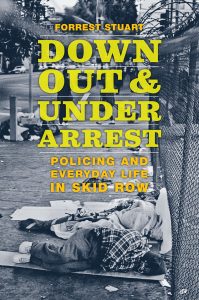Forrest Stuart: Down, Out, and Under Arrest on Skid Row

Forrest Stuart’s Down, Out, and Under Arrest: Policing and Everyday Life in Skid Row puts to use the author’s five years of ethnographic research on LA’s Skid Row, home to one of the most stable (and sizable) homeless populations in the nation, and demonstrates what it looks like to police poverty in the US today. (Hint: Stuart was stopped by police 14 times during his first year working in the neighborhood.)
From an interview with Stuart at Mother Jones:
Mother Jones: What struck you during your time on the streets that might be useful to policymakers?
Forrest Stuart: Right away I started seeing how the police, in part just because of their numbers in Skid Row, were creating a situation I’d never seen before. Just as a guy was starting to get on his feet—for example, he had finally secured a bed at a shelter—some small infraction would cut him back.
“The places that people need most—like a soup kitchen or homeless shelter—become really risky, because that’s where the police are.”It could be as little as getting a single ticket for loitering. For people living on dollars at day, to suddenly have to pay $150 for a sidewalk ticket is huge! If they don’t pay, they can be arrested. Not only do they have to spend time in jail, they usually lose their bed at the shelter or their room in low-rent apartments. In a lot of shelters or apartments, if someone doesn’t show up at the end of the day, the managers give away all their things. So now they’d be right back to square one. Broke, homeless, just trying to get a roof over their head. The bootstraps were cut.
For someone like you or me, you get a ticket, you pay it, it sucks. That ticket can mean we can’t have a drink tonight, or we have to cut back at the grocery store. Our interactions with police and the criminal justice system are generally just a nuisance. But once you go below a certain socioeconomic status, these seemingly trivial, mundane, momentary interactions with the police restructure everything.
The other really important complication is that some of the places that people need most—like a soup kitchen or homeless shelter—become really risky, because that’s where the police are, giving tickets and making arrests for small things like blocking the sidewalk. So people start to actively avoid those places. If the police are stopping and questioning you about, say, loitering, or not having ID, or for talking to a stranger (who happens to be the person handing out sandwiches) and you get hauled off to the station, you start to change your behavior for the worse. You start to avoid or refuse services.
***
MJ: So we’ve essentially made poverty illegal, and addiction, too—if you’re poor.
FS: We can think about inequality as income and wealth. But there are a whole host of other things that you don’t see unless you are standing there watching it for a long time. When cities use misdemeanor arrests in low-income communities as a corrective, what they don’t understand is that these policies constrict every decision that someone with so few options has to make.
“Most of the residents’ cognitive energy is directed to two things: ‘How do I stay off the cops radar, and how do I stay safe?'”When I step out of my house, I think about what I might be teaching that day or what I’m going to have for dinner. In Skid Row most of the residents’ cognitive energy is directed to two things: “How do I stay off the cops’ radar, and how do I stay safe—how do I avoid becoming a victim today?” Essentially, what people have to think about all the time is, “How do I prove to police that I’m not a bad person? How can I be sure I don’t look like an addict?” (Don’t pick at your clothes, don’t pick at your skin, don’t scratch your head.) It’s an incredible amount for a person to take in. It makes it really hard to concentrate on everyday things—like being a good employee if you do have a job, or pulling off a job interview.
Those of us in the middle class aren’t sitting on the sidewalk because we don’t have to, or we have a job or a home to go to. Plus, even if most of us did sit down on the sidewalk or walk down the street picking at our clothes, we aren’t going to get that ticket. Those policies amount to a double criminalization of poverty.
***
To read the interview in full at Mother Jones, click here.
To read an excerpt from the book, click here.
To read more about Down, Out, and Under Arrest, click here.